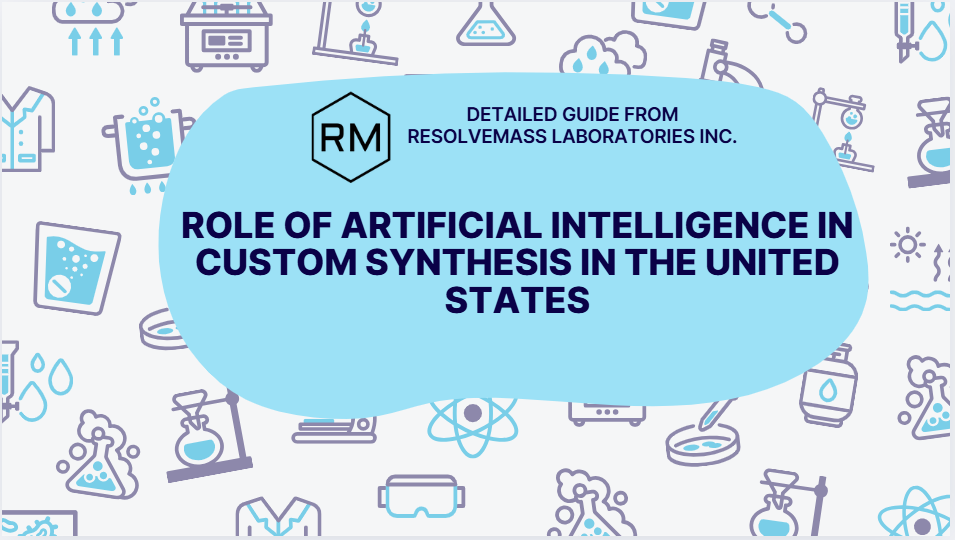
Custom synthesis has become a cornerstone of the pharmaceutical, chemical, and biotechnology industries, driving innovation and enabling tailored solutions for specific research and production needs. With the exponential growth of artificial intelligence (AI) technologies, custom synthesis has reached new frontiers in the United States, delivering unprecedented precision, efficiency, and innovation.
This blog explores the transformative role of AI in custom synthesis in the United States. We’ll delve into the applications, benefits, challenges, and future potential of this exciting convergence of science and technology.
Understanding Custom Synthesis
Custom synthesis refers to the process of designing and producing specific chemical compounds or molecular entities as per client requirements. These compounds often serve as intermediates, reagents, or final products in research and industrial processes. The complexity of custom synthesis demands significant expertise, time, and resources.
Key Areas of Custom Synthesis:
- Small-Molecule Synthesis: Small molecules are the backbone of pharmaceuticals, agrochemicals, and specialty chemicals. These compounds often require intricate synthetic routes, making them ideal candidates for AI-driven process optimization.
- Peptide Synthesis: Peptides are essential for a range of applications, from therapeutics to diagnostics. Custom peptide synthesis ensures high purity and specificity, which AI can enhance through predictive modeling and quality control.
- Polymer Synthesis: Advanced materials and coatings rely on custom polymers. AI can predict polymer properties and design efficient synthesis routes, reducing the development timeline.
- Dendrimer and Nanomaterial Synthesis: Dendrimers and nanomaterials are critical for nanotechnology and drug delivery systems. AI facilitates their design by modeling complex structures and predicting functional outcomes.
The AI Revolution in Custom Synthesis
Artificial Intelligence, with its data-driven algorithms, machine learning (ML), and predictive analytics, has redefined how scientists and researchers approach custom synthesis. AI is particularly transformative in six major areas:
1. Molecular Design and Prediction
Designing a molecule to meet specific requirements is a complex and time-consuming task. AI-powered tools such as deep learning algorithms and generative adversarial networks (GANs) have significantly streamlined this process. For example:
- AlphaFold: Predicts protein structures with high accuracy, aiding in peptide and protein synthesis [DOI: 10.1038/s41586-021-03819-2].
- ChemProp: A machine learning platform that predicts molecular properties, such as solubility and toxicity, enabling researchers to focus on viable candidates [DOI: 10.1021/acs.jcim.9b00237].
2. Synthetic Route Optimization
AI excels at identifying and optimizing synthetic pathways. Retrosynthesis—the process of deconstructing a target molecule into simpler precursors—has been revolutionized by AI.
- IBM’s RXN for Chemistry: Uses natural language processing to predict reaction outcomes and suggest the most efficient synthetic routes.
- Deep Neural Networks: Help identify novel reaction mechanisms, as demonstrated in Segler et al. (2018) [DOI: 10.1038/nature25978].
AI enables:
- Reduction of byproducts and waste.
- Selection of eco-friendly solvents and catalysts.
- Significant cost savings in material and labor.
3. Automation in Laboratory Processes
AI-powered automation has made laboratory processes more efficient and reliable. Automated systems, such as high-throughput screening platforms and robotic arms, enable:
- Parallel testing of multiple reaction conditions.
- Real-time monitoring and adaptive control of synthesis processes.
- AI-assisted troubleshooting to address unexpected issues.
These systems drastically reduce the time and effort required for trial-and-error experiments.
4. Predictive Analytics for Yield and Quality
Yield and quality are critical factors in custom synthesis, especially for pharmaceutical applications. AI algorithms analyze vast datasets to predict:
- Optimal reaction conditions (temperature, pressure, solvent, and catalyst).
- Potential side reactions and impurity profiles.
- Scalable processes for industrial production.
For example, machine learning models have successfully predicted the outcomes of complex multi-step reactions, ensuring consistent product quality.
5. Integration of Big Data and AI
The United States is home to some of the most extensive chemical databases, including the American Chemical Society’s repositories. AI leverages these datasets to:
- Train predictive models for novel compound discovery.
- Identify trends in chemical synthesis and material development.
- Accelerate the search for unique molecules with desirable properties.
6. AI in Green Chemistry
Sustainability is a growing concern in chemical synthesis. AI enables green chemistry by:
- Designing synthetic routes that minimize waste and energy consumption.
- Predicting the environmental impact of synthetic processes.
- Identifying catalysts that improve reaction efficiency.
For example, AI-driven models have successfully identified catalysts for CO2 conversion into useful chemicals, contributing to carbon neutrality goals.
Benefits of AI in Custom Synthesis
AI brings numerous benefits to custom synthesis, including:
- Speed: AI reduces the time required for molecular design, reaction optimization, and process scale-up.
- Cost Efficiency: By minimizing material wastage and labor, AI lowers the overall cost of synthesis.
- Precision: Advanced algorithms ensure higher accuracy in molecular design and reaction prediction.
- Scalability: AI simplifies the transition from lab-scale synthesis to industrial production.
- Innovation: By exploring unconventional synthetic routes, AI opens new avenues for material and drug discovery.
- Sustainability: AI promotes green chemistry practices, aligning with environmental regulations and corporate sustainability goals.
Challenges in AI-Driven Custom Synthesis IN U.S
Despite its transformative potential, AI adoption in custom synthesis is not without challenges:
- Data Quality and Availability: AI models rely on large, high-quality datasets. Incomplete or inconsistent data can lead to inaccurate predictions.
- Integration Complexity: Incorporating AI into traditional workflows requires significant infrastructure investment and technical expertise.
- Ethical and Legal Concerns: Issues such as intellectual property rights, data privacy, and AI bias need to be addressed.
- Model Interpretability: Complex AI models, such as deep neural networks, often act as “black boxes,” making it difficult to understand their decision-making processes.
- Adoption Resistance: Traditional chemists and researchers may be hesitant to adopt AI tools due to a lack of familiarity or trust.
Success Stories: AI and Custom Synthesis in the U.S
1. Pharmaceutical R&D
Pharmaceutical giants like Pfizer and Novartis have integrated AI into their custom synthesis workflows. Pfizer used AI to optimize the synthesis of COVID-19 vaccines, reducing development time and scaling up production efficiently [DOI: 10.1016/j.xphs.2020.03.012].
2. Chemical Industry Innovations
Companies like Dow Chemical use AI to design advanced polymers with enhanced performance characteristics. AI-driven simulations have reduced the need for extensive experimental trials.
3. Academic Research Top-tier institutions such as MIT and Stanford employ AI in custom synthesis for energy storage materials and biomedical applications. For instance, AI-guided synthesis of metal-organic frameworks (MOFs) has led to breakthroughs in gas storage and separation technologies
The Future of AI in Custom Synthesis
1. Personalized Medicine
AI will enable the synthesis of drugs tailored to individual genetic profiles, ushering in a new era of personalized medicine in the United States.
2. AI-Driven Sustainability
With increasing regulatory focus on sustainability, AI will play a pivotal role in developing carbon-neutral and eco-friendly synthetic processes.
3. Quantum Computing Synergy
The integration of quantum computing with AI promises to revolutionize molecular modeling and synthetic chemistry, enabling unprecedented computational power.
4. AI-Powered Collaboration
AI will facilitate global collaboration by connecting researchers and sharing insights in real-time, accelerating innovation
Role of Artificial Intelligence in Custom Synthesis in the United States
Unlocking the Secrets of Complex Formulations
Get Started with Your Project
REFERENCES
- Struble TJ, Alvarez JC, Brown SP, Chytil M, Cisar J, DesJarlais RL, Engkvist O, Frank SA, Greve DR, Griffin DJ, Hou X. Current and future roles of artificial intelligence in medicinal chemistry synthesis. Journal of medicinal chemistry. 2020 Apr 3;63(16):8667-82.
- Thakkar A, Johansson S, Jorner K, Buttar D, Reymond JL, Engkvist O. Artificial intelligence and automation in computer aided synthesis planning. Reaction chemistry & engineering. 2021;6(1):27-51.
- Coley CW, Thomas III DA, Lummiss JA, Jaworski JN, Breen CP, Schultz V, Hart T, Fishman JS, Rogers L, Gao H, Hicklin RW. A robotic platform for flow synthesis of organic compounds informed by AI planning. Science. 2019 Aug 9;365(6453):eaax1566.
End-to-End Biomarker Bioanalytical Services Offered by a CRO: Capabilities and Expectations
Introduction Biomarker bioanalytical services CRO partnerships have become indispensable in modern pharmaceutical development, providing the…
Regulatory-Compliant Biomarker Bioanalytical Services for FDA and Health Canada Submissions
Introduction Biomarker bioanalytical services for FDA and Health Canada submissions require rigorous compliance with regulatory…
Outsourced Medicinal Chemistry for Startups: Cost, Speed, and Scientific Advantages
🔍 Summary (Key Takeaways) Outsourced medicinal chemistry for startups offers a strategic advantage by minimizing…
Why Early-Stage Biotech Companies Outsource Chemistry Services to Drug Discovery CROs
Introduction Early-stage biotech companies are increasingly adopting Outsourced Chemistry Services for Biotech to stay competitive…
Why Early-Stage Biotech Companies Outsource Bioanalytical Services to CROs
Introduction Outsourced bioanalytical services play a critical role in helping early-stage biotech companies overcome scientific,…
7 Questions to Ask Before Collaborating with a Full Service Drug Discovery CRO
Summary Before partnering with a Full Service Drug Discovery CRO, the following key questions can…







